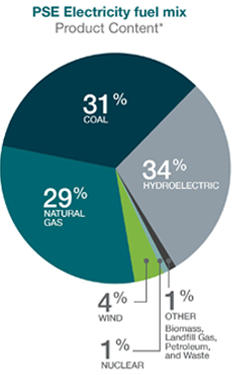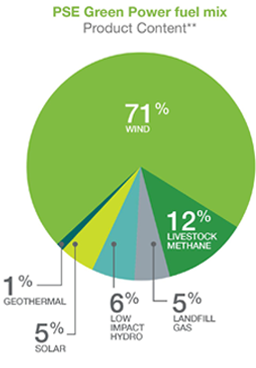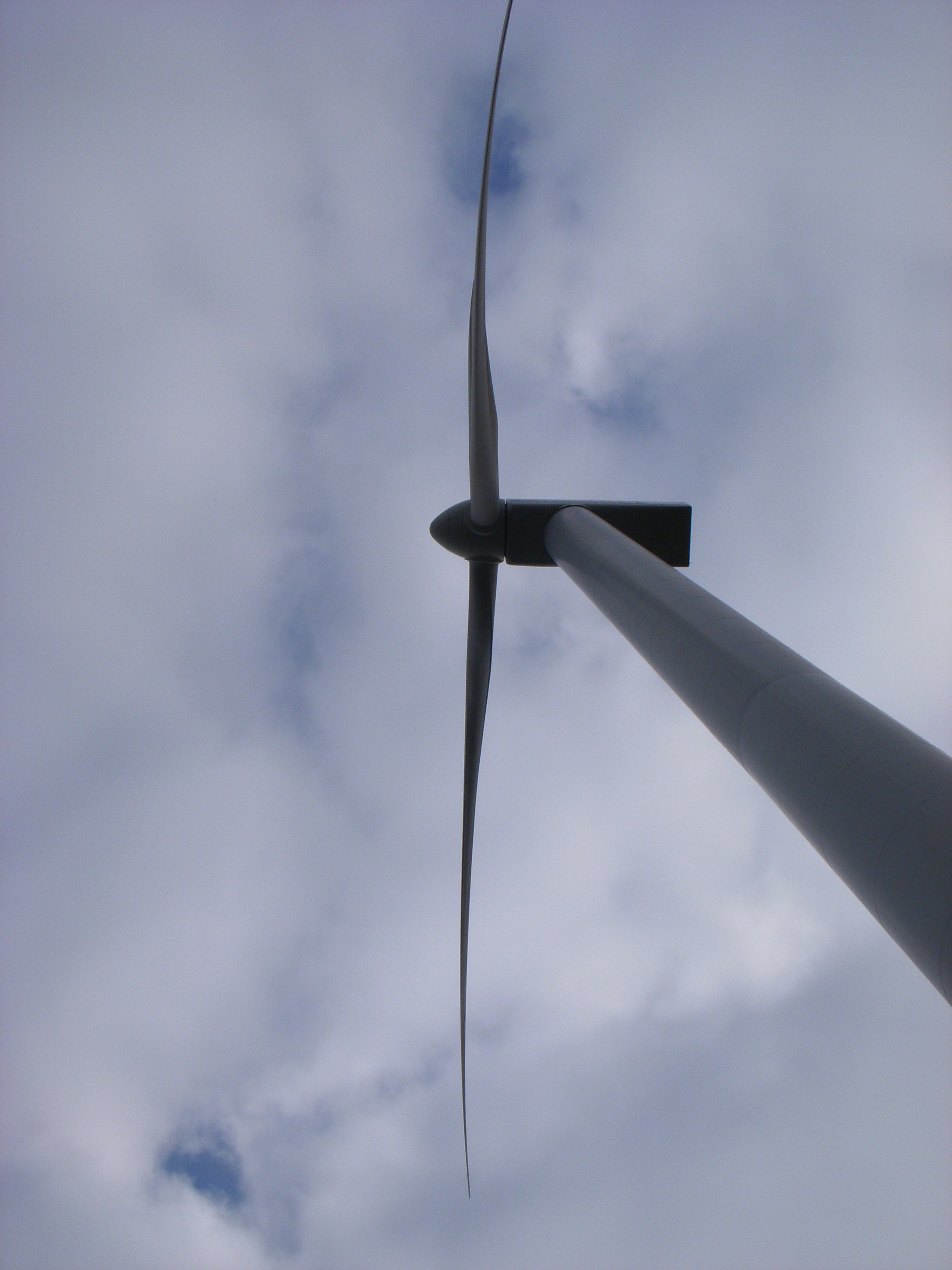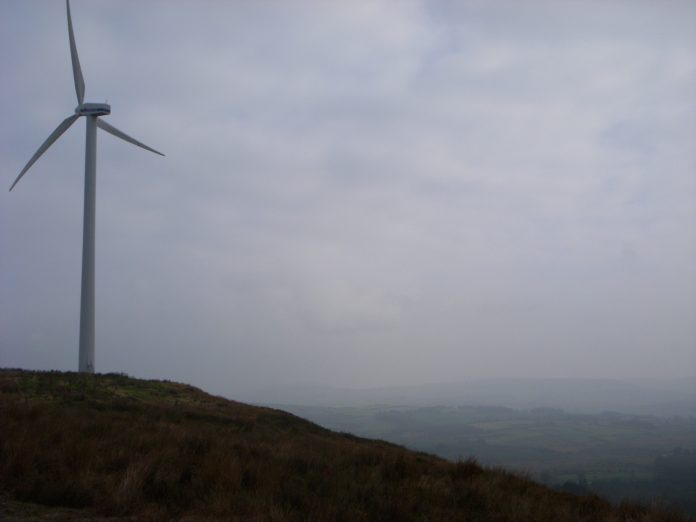Link Light Rail trains are poised to become super green. On Tuesday, Sound Transit announced a long-term agreement with Puget Sound Energy (PSE) to supply light rail with green energy through its Green Direct program. Sound Transit will purchase wind power from PSE for light rail energy needs. The energy to be supplied for light rail will 100% wind power. According to an approved motion by the Sound Transit Board of Directors, the agreement will launch in 2019 making the system carbon neutral over a 10-year period and saving the Sound Transit up to $533,000 in energy costs.
Sound Transit receives energy from both PSE and Seattle City Light (SCL) to power light rail and agency facilities. The agency already powers much of its needs with renewable energy since SCL is already 100% carbon neutral (powered mostly by hyrdoelectricity). The agreement with PSE will help Sound Transit go deeper by transforming the remaining 24.2% of light rail’s energy supply (approximately 6.7 million kWh of electricity annually) into green wind power. However, since the light rail share of energy consumption represents 49% of the agency needs from PSE, there is still ample room to add more green power in the future.
PSE’s current energy mix is less sustainable that one might think. While green energy like wind and biomass make up a small share of the utility’s energy supply, the largest shares come from conventional hydroelectricity (dams), coal, and natural gas–with coal being the dirtiest of the trio. Conventional hydroelectricity itself is a fairly unsustainable energy source–despite essentially zero emissions and renewable–given that it has significant negative impacts to riverways and land, causes riverway and coastal erosion due to sedimentation blockages by dams, and threatens salmonid species.

PSE already has a Green Power program for individual customers. Its energy is mix is different from the Green Direct program, which was a special program developed separately for large-scale customers like Sound Transit that want to purchase deeply green energy. The goal of the Green Direct program is to build new reliable wind power facilities at a reasonable rate to program participants. In this case, PSE plans to construct new wind power facilities in Thurston and Lewis Counties on land owned by Weyerhauser. A total of 52 wind turbines are proposed as part of the Skookumchuck Wind Energy project near Olympia. Permits to build the facilities have already been approved, so at this point, it is only a matter of when construction can commence–and hence the agreement sets a 2019 start date.

Joining the Green Direct is a good deal for Sound Transit since it actually reduces ongoing energy costs, guards against future energy rate hikes, and requires no up-front capital costs to buy-in. Under the terms of the agreement with PSE, rate increases for energy consumption will be set at 2.0% annually. Forecasted rate increases are projected to be 2.4% and 5.6% over the 10-year period, according to industry analysis. So the lower annual rate increases should mean significant savings, up to $533,000 under the highest rate increase scenario.

Commenting on the program, Sound Transit Board Chair and Snohomish County Executive Dave Somers said:
Sound Transit continues to demonstrate that being a sustainability leader can be done both with minimal expense and maximum positive impact on our economy. This agreement allows us to make Link light rail service carbon neutral while improving regional air quality and investing in local clean energy projects.
Sound Transit CEO Peter Rogoff also praised the green move:
This innovative agreement with Puget Sound Energy sets Sound Transit as a leader in providing clean energy services. By operating Link light rail on green power starting in 2019, Sound Transit will offer transit users a carbon-neutral option for leaving their cars behind and help reduce the region’s greenhouse gas emissions.
Sound Transit has ambitious long-term sustainability plans. By 2030, the agency hopes to have all facilities owned and operated by the agency become carbon neutral. With the increasing share of light rail as part of the agency’s portfolio, that largely should be an easier thing to achieve through preferred energy sources. However, the agency also runs diesel-powered commuter rail and buses (which are generally hybrids). The advent of fully green buses and non-catenary trains, such as Proterra electric buses and Alstom hydrogen-powered trains, could offer possible solutions to creating a greener vehicle fleet.
Sound Transit also recognizes medium-term issues like the extension of light rail to Lynnwood. At the Snohomish County line, energy providers switch meaning that Snohomish County Public Utility District No. 1 (PUD) will be the primary utility for portions of the light rail line north of the county line. PUD’s energy mix isn’t fully carbon neutral, which could force Sound Transit to take a step back in meeting sustainability goals if the agency cannot work out a Green Direct-like program with PUD. Extensions to Federal Way and Redmond, too, won’t be covered under PSE’s Green Direct–at least not for now.
Nevertheless, Sound Transit’s sustainability-focused mindset should help the agency progressively become fully green in the years ahead by seeking reasonable solutions. That’s good for customers and the region as Puget Sound communities and the state strive to drastically cut carbon emissions to mitigate climate change and improve public health.
Stephen is a professional urban planner in Puget Sound with a passion for sustainable, livable, and diverse cities. He is especially interested in how policies, regulations, and programs can promote positive outcomes for communities. With stints in great cities like Bellingham and Cork, Stephen currently lives in Seattle. He primarily covers land use and transportation issues and has been with The Urbanist since 2014.


